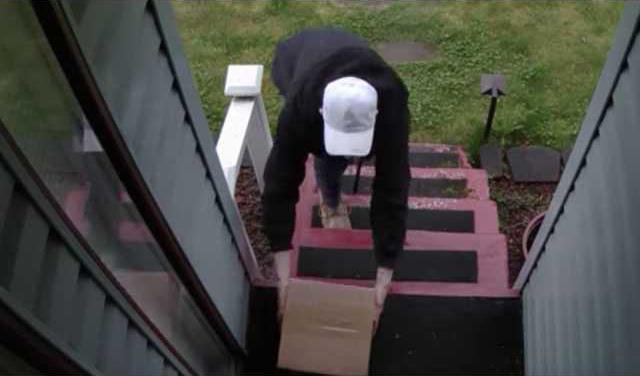Jaireme Barrow was fed up with thieves stealing his packages from his front porch during the holiday season, so he invented a device that would scare the pants off those robbers. Its called TheBlankBox.
Born from his idea to scare people away with a shotgun, Barrows new device is a dummy box that plays the sound of a 12-gauge shotgun firing into the air. No bullets or shells or gunfire.
I was thinking, how could I scare them and make them drop my package and then never come to my front porch again, Barrow told The Washington Post. And I thought, Getting shot at is scary. Thatll make them think twice.
TheBlankBox is a package that appears to be a normal Christmas gift, but when people touch it, the gunshot sound rings out, scaring customers from your porch.
Dont believe it? Barrow shared videos of the thieves running away on YouTube.
If this at all looks familiar, its probably because of a little Christmas movie called Home Alone, where the main character Kevin McCallister scares away two robbers using the sounds of a violent scene in an in-film movie.
Heres that scene.
People can buy TheBlankBox for $60. It takes 14 to 21 days to arrive, so it may not be the right gifts for this Christmas season.
According to a new survey from Xfinity Home, 30 percent of Americans say theyve experienced package theft at their homes. More than half of Americans say they know someone else who experienced the problem, too.
A pair of suspected package thieves made headlines in Utah earlier in December. The pair of thieves allegedly fired a semi-automatic handgun at a witness who saw the couple stealing the package, according to the Deseret News.
As the holiday count-down begins, consumers face a tradeoff between convenience and the risk of letting expensive goods sit out in the open for anyone to snatch, according to USA Today. That's prompted some unusual work-arounds from consumers and increased the incentive for delivery services, home-security providers and some police departments to find ways to crack down on package thefts.
Home security systems have become one major way people are staying safe from theft during the holiday season, USA Today reported. Police departments have been coy about whether the devices actually help.
For example, Det. Linda Longo of the Philadelphia Police Department told USA Today security devices take video that can be shared with other people, which allows them to identify the thieves.
But Capt. Gary Berg with the Campbell police department in California said he has only seen theft security devices work once.
People who are relying on the camera to protect their packages are probably kidding themselves, he said.
If your package is stolen, the USPS allows you to file a claim for insured mail and some packages. You can review more about when you can file a claim on the USPS website.
Born from his idea to scare people away with a shotgun, Barrows new device is a dummy box that plays the sound of a 12-gauge shotgun firing into the air. No bullets or shells or gunfire.
I was thinking, how could I scare them and make them drop my package and then never come to my front porch again, Barrow told The Washington Post. And I thought, Getting shot at is scary. Thatll make them think twice.
TheBlankBox is a package that appears to be a normal Christmas gift, but when people touch it, the gunshot sound rings out, scaring customers from your porch.
Dont believe it? Barrow shared videos of the thieves running away on YouTube.
If this at all looks familiar, its probably because of a little Christmas movie called Home Alone, where the main character Kevin McCallister scares away two robbers using the sounds of a violent scene in an in-film movie.
Heres that scene.
People can buy TheBlankBox for $60. It takes 14 to 21 days to arrive, so it may not be the right gifts for this Christmas season.
According to a new survey from Xfinity Home, 30 percent of Americans say theyve experienced package theft at their homes. More than half of Americans say they know someone else who experienced the problem, too.
A pair of suspected package thieves made headlines in Utah earlier in December. The pair of thieves allegedly fired a semi-automatic handgun at a witness who saw the couple stealing the package, according to the Deseret News.
As the holiday count-down begins, consumers face a tradeoff between convenience and the risk of letting expensive goods sit out in the open for anyone to snatch, according to USA Today. That's prompted some unusual work-arounds from consumers and increased the incentive for delivery services, home-security providers and some police departments to find ways to crack down on package thefts.
Home security systems have become one major way people are staying safe from theft during the holiday season, USA Today reported. Police departments have been coy about whether the devices actually help.
For example, Det. Linda Longo of the Philadelphia Police Department told USA Today security devices take video that can be shared with other people, which allows them to identify the thieves.
But Capt. Gary Berg with the Campbell police department in California said he has only seen theft security devices work once.
People who are relying on the camera to protect their packages are probably kidding themselves, he said.
If your package is stolen, the USPS allows you to file a claim for insured mail and some packages. You can review more about when you can file a claim on the USPS website.








